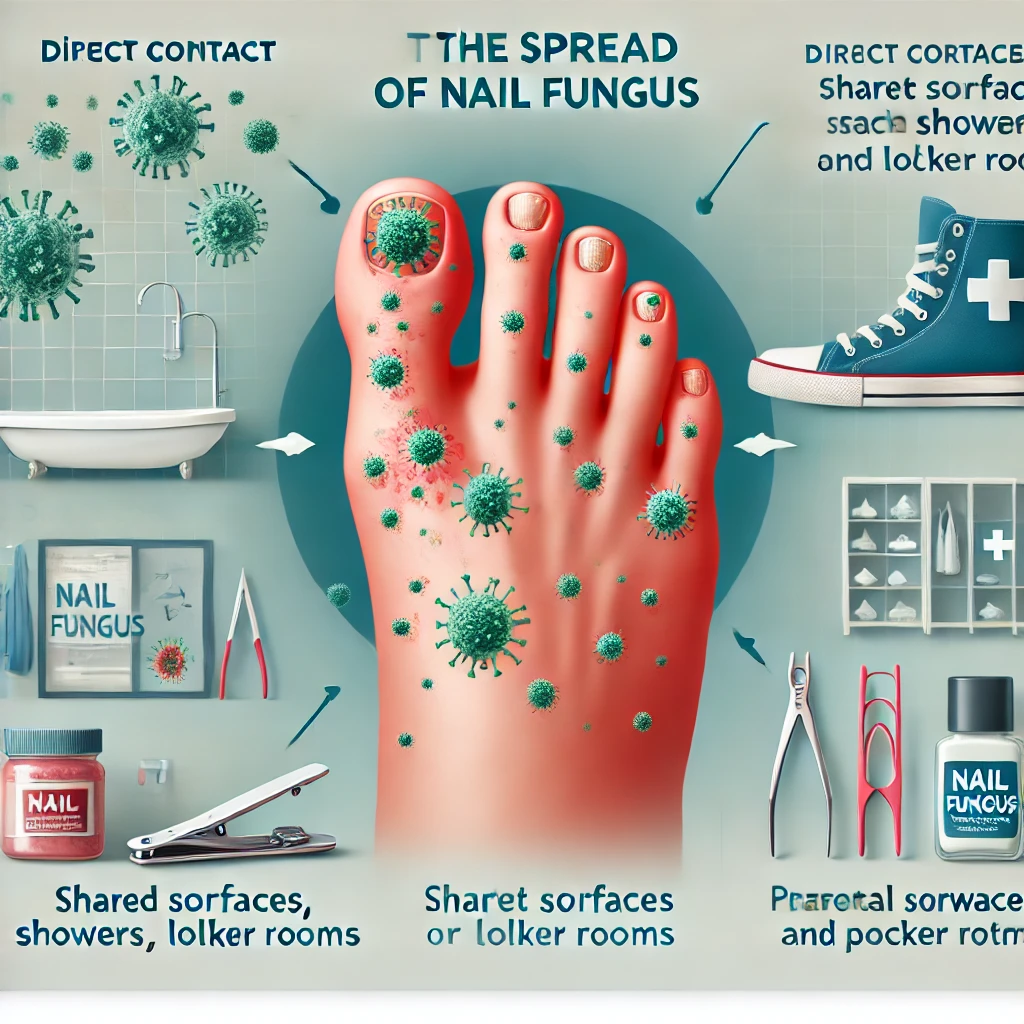Nail fungus, also known as onychomycosis, is a common and stubborn infection that affects millions of people. One of the biggest concerns for those suffering from nail fungus is whether it can spread to others. The answer is yes—nail fungus is contagious and can be transmitted in various ways. In this article, we will discuss how nail fungus spreads, who is at risk, and what steps you can take to protect yourself and your loved ones.
Table of Contents
ToggleHow Nail Fungus Spreads
Nail fungus is caused by dermatophytes, yeast, or mold, which thrive in warm and moist environments. It can spread in several ways:
1. Direct Contact
If you have nail fungus, direct contact with another person’s skin or nails can lead to transmission. This is especially common among family members who live together.
2. Shared Surfaces
Public places like gyms, swimming pools, and locker rooms provide an ideal environment for fungal growth. Walking barefoot in these areas increases the risk of infection.
3. Sharing Personal Items
Using infected nail clippers, towels, shoes, socks, or bed linens can spread the fungus from one person to another.
4. From One Nail to Another
Fungal infections can spread from one nail to another, especially if left untreated. It may start in a toenail and later affect fingernails or vice versa.
Who is at Risk of Getting Nail Fungus?
Certain factors make some people more susceptible to nail fungus than others:
- Elderly Individuals: Reduced blood circulation and slower nail growth make older adults more vulnerable.
- People with Weak Immune Systems: Those with conditions like diabetes, HIV, or undergoing chemotherapy are at higher risk.
- Athletes and Swimmers: Frequent exposure to damp environments increases the likelihood of infection.
- Individuals with Nail Injuries: Cracked or damaged nails provide an entry point for fungus.
- People with Poor Foot Hygiene: Not washing and drying feet properly can create an environment where fungus thrives.

How to Protect Your Loved Ones from Nail Fungus
While nail fungus is highly contagious, there are steps you can take to minimize the risk of spreading it to your family and friends.
1. Maintain Good Hygiene
- Wash your hands and feet daily with soap and water.
- Dry thoroughly, especially between the toes.
2. Avoid Walking Barefoot in Public Places
Always wear flip-flops or sandals in communal showers, locker rooms, and pools.
3. Do Not Share Personal Items
- Keep your nail clippers, socks, towels, and shoes to yourself.
- Wash towels and bed linens frequently.
4. Keep Your Feet and Nails Dry
Fungus thrives in moist environments, so:
- Wear moisture-wicking socks.
- Change socks regularly.
- Use antifungal powders or sprays.
5. Disinfect Shoes and Nail Tools
Use antifungal sprays inside shoes and disinfect nail clippers with alcohol.
6. Trim Nails Properly
Keep nails short and filed to prevent fungal buildup and limit the spread.
Treatment Options for Nail Fungus
If you or a loved one has nail fungus, early treatment is essential to prevent further spread.
1. Oral Antifungal Medications
Prescription medications like terbinafine and itraconazole are highly effective but may have side effects.
2. Topical Antifungal Treatments
Medicated nail lacquers and creams can help treat mild infections but require consistent use for months.
3. Laser Therapy
A non-invasive treatment that kills the fungus using light energy, but it can be expensive.
4. Home Remedies
Some people use natural remedies like tea tree oil, vinegar soaks, and hydrogen peroxide, but scientific evidence on their effectiveness is limited.
Preventing Reinfection
Even after successfully treating nail fungus, reinfection is possible. To avoid it:
- Continue practicing good foot hygiene.
- Replace old socks and shoes that may contain fungal spores.
- Regularly disinfect household surfaces and personal care items.
Conclusion
Nail fungus is a highly contagious condition that can spread through direct contact, shared surfaces, and personal items. Understanding how it spreads and taking preventive measures can help protect your loved ones. If you suspect a nail fungus infection, seek treatment early to prevent further complications. By maintaining good hygiene and avoiding risk factors, you can keep your nails healthy and free from infection.
FAQ
1. Can nail fungus spread to family members?
Yes, nail fungus is contagious and can spread through direct contact or shared items like towels and nail clippers.
2. Can I get nail fungus from a pedicure?
Yes, if the salon does not properly sanitize its tools, you can contract nail fungus during a pedicure.
3. Is nail fungus more contagious in wet conditions?
Yes, fungus thrives in warm, moist environments, making wet conditions like locker rooms and pools high-risk areas.
4. How long does nail fungus take to spread?
The spread of nail fungus varies. It can take weeks or months for an infection to move from one nail to another or from person to person.
5. Can nail fungus affect other parts of the body?
Yes, if left untreated, nail fungus can spread to the skin (causing athlete’s foot) or even other nails.
6. Can children get nail fungus from their parents?
Yes, children can contract nail fungus through direct contact or shared household items.
7. What should I do if I suspect I have nail fungus?
Start treatment as soon as possible and take preventive measures to protect others in your household.
It is important for people considering skin tag removal in plano , laser hair removal in plano ,microneedling in plano, Hydrafacial in plano, Microdermabrasion plano, Laser electrolysis plano, Nail Fungus plano, Rosacea Treatment in plano, Spider Vein Removal plano, Wrinkle Reduction in plano, Botox in plano, Hifu in plano,Oxygeno Facial in Plano to undergo a full consultation with a qualified doctor or cosmetologist – Aesthetician Nasrin, – to assess their suitability for this procedure and discuss their .
No comment yet, add your voice below!